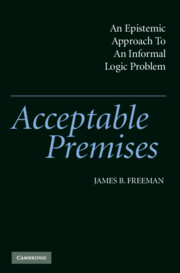Book contents
- Frontmatter
- Contents
- Preface
- Acknowledgments
- PART 1 ACCEPTABILITY: DIALECTICAL AND EPISTEMOLOGICAL COSIDERATIONS
- PART 2 STATEMENTS, BELIEF-GENERATING MECHANISMS, AND PRESUMPTIVE RELIABILITY
- 5 What Types of Statements Are There?
- 6 Necessary Statements and A Priori Intuition
- 7 Descriptions and Their Belief-Generating Mechanisms
- 8 Interpretations and Their Modes of Intuition
- 9 Evaluations and the Moral Faculties
- 10 Taking One's Word: The Interpersonal Belief-Generating Mechanism
- PART 3 PRACTICE AND PERSPECTIVE
- Notes
- References
- Index
7 - Descriptions and Their Belief-Generating Mechanisms
Published online by Cambridge University Press: 02 December 2009
- Frontmatter
- Contents
- Preface
- Acknowledgments
- PART 1 ACCEPTABILITY: DIALECTICAL AND EPISTEMOLOGICAL COSIDERATIONS
- PART 2 STATEMENTS, BELIEF-GENERATING MECHANISMS, AND PRESUMPTIVE RELIABILITY
- 5 What Types of Statements Are There?
- 6 Necessary Statements and A Priori Intuition
- 7 Descriptions and Their Belief-Generating Mechanisms
- 8 Interpretations and Their Modes of Intuition
- 9 Evaluations and the Moral Faculties
- 10 Taking One's Word: The Interpersonal Belief-Generating Mechanism
- PART 3 PRACTICE AND PERSPECTIVE
- Notes
- References
- Index
Summary
Our goal in this chapter is first to identify the various personal mechanisms that generate basic beliefs that are descriptions and then to discuss whether and under what circumstances each of these mechanisms is presumptively reliable, and what grounds that presumption. Our first step again will be to determine what types of descriptions there are. For each type, we proceed to ask what personal mechanisms generate basic descriptive beliefs of that type. This is our project in the next section. In subsequent sections we shall discuss the presumptive reliability of each of the mechanisms identified.
WHAT TYPES OF DESCRIPTIONS ARE THERE?
Let us begin by looking at some intuitive examples of descriptions:
A bus is passing my office window.
The house across the street is painted white.
I have a pain in my right leg.
The last time my friends were over for dinner I served chicken.
I felt a curious sensation of warmth when the medication was injected.
The program will come on in a half-hour.
The sun will rise tomorrow.
During the second week of January, thirty homeless persons were found dead on the streets of New York.
Fifty percent of the voters polled said they disapproved of the president's job performance.
Fifty percent of the voting population disapproves of the president's job performance.
All swans are white.
None of the children in the room have brought their lunches.
These examples illustrate the various types of descriptions. The distinction of reports from generalizations dividing statements (1)–(8) from (9)–(12) is principal.
- Type
- Chapter
- Information
- Acceptable PremisesAn Epistemic Approach to an Informal Logic Problem, pp. 124 - 142Publisher: Cambridge University PressPrint publication year: 2004



